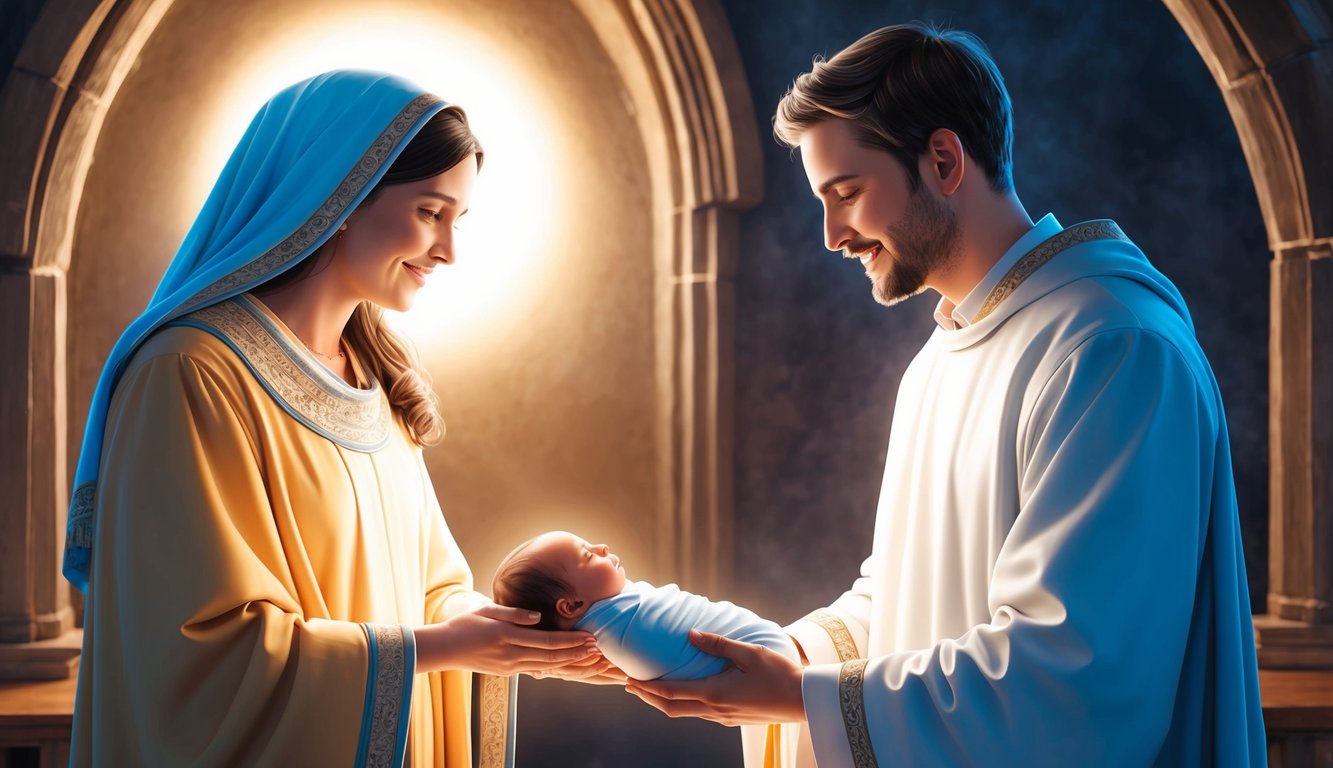Don’t Miss Out On This Unique Astrological Opportunity
Are you tired of spinning your wheels and getting nowhere? Simply put, you’re out of sync: you’re out of alignment with your astral configuration.
But: there’s a kind of map that can help you reclaim your alignment. Think of it as your own personal blueprint to success and happiness: a blueprint that will help you live your most amazing life.
Get started here.
The first chapter of Luke sets the stage for two of the most significant births in history.
You’ll read about the angel Gabriel visiting Zechariah to announce the birth of John the Baptist.
When Zechariah reacts with disbelief, he is rendered speechless until the prophecy comes true.
This moment raises intriguing points about faith and the consequences of doubt.
Another key part of Luke 1 is the announcement of Jesus’s birth. Mary, a young woman from Nazareth, receives a visit from the angel Gabriel.
Mary learns she will give birth to Jesus, the Son of God.
Mary’s acceptance of this news is profound and highlights her exceptional faith.
Later, you’ll discover Mary’s song of praise, often called the Magnificat.
This song shows her deep gratitude and the immense joy she feels about God’s plan.
You’ll find that the chapter ends with the birth and naming of John, bringing Zechariah’s prophecy full circle.
Key Takeaways
- Luke 1 introduces the births of John the Baptist and Jesus.
- Faith and prophecy are central themes in Luke 1.
- Mary’s song reflects her gratitude and joy.
The Announcement of John the Baptist’s Birth
An angel named Gabriel told Zechariah, a priest, that he and his wife Elizabeth would have a son named John.
Despite their old age, this child would bring joy and play a key role in preparing people for the Lord.
Gabriel’s Visit to Zacharias
Gabriel, an angel, visited Zacharias while he was serving as a priest in the temple.
It happened when Zacharias was chosen to burn incense, a special duty for priests.
As he performed this duty, Gabriel appeared to him.
Zacharias felt fear when Gabriel appeared, but the angel reassured him.
Gabriel told him that his prayers had been heard.
Despite Elizabeth’s old age, they would have a son named John.
This news was astonishing, as Elizabeth had been unable to have children.
Gabriel shared that John would be filled with holiness and the spirit of Elijah.
His role would be to prepare the people for God.
This visit had a significant impact, filling Zacharias with both awe and fear.
The Significance of John’s Name
Gabriel instructed that the child be named John, which was unique because family names were customary.
The name John means “God is gracious,” highlighting God’s favor.
This name held a special purpose.
Naming John signified a break from tradition, showing God’s new plan for the people.
John’s mission was to bring people back to righteousness and holiness.
He would prepare the way for Jesus, offering hope and joy.
This naming also symbolized the joy that John would bring.
Many would rejoice at his birth because of his importance in the divine plan.
It was clear that John’s life would have power and influence.
Elizabeth’s Response
Elizabeth, the wife of Zacharias, reacted with great joy and gratitude.
Despite being old and childless, she felt blessed to carry John. Her faith was strong, seeing this as a removal of her disgrace.
Elizabeth’s response was filled with joy and praise.
She understood the importance of this miraculous birth.
This moment brought her closer to God and highlighted her righteousness.
Elizabeth’s pregnancy was a wonder to her community, but she remained humble.
Her joy was a testament to God’s grace and the special role her child would play in the world.
The Announcement of Jesus’s Birth
In Luke 1, you find the remarkable story of how Jesus’s birth was announced to Mary by the angel Gabriel.
This event not only changed Mary’s life but also fulfilled ancient prophecies about the coming Savior.
Mary’s Encounter with Gabriel
In the sixth month of Elizabeth’s pregnancy, the angel Gabriel came to Mary in Nazareth, a town in Galilee.
Mary was a virgin, pledged to Joseph, a descendant of David.
Gabriel greeted her with the words, “Hail, favored one! The Lord is with you.” This greeting puzzled Mary greatly.
Gabriel reassured her not to fear, explaining she had found favor with God and would conceive and bear a son named Jesus.
Mary, while amazed, questioned how this could happen since she was not yet married.
Gabriel explained that the Holy Spirit and God’s power would make it possible, emphasizing the boundless ability of God.
Prophecy of Jesus as the Son of God
Gabriel told Mary that her son, Jesus, would be great and called the Son of the Most High.
He promised that Jesus would inherit the throne of David and reign over Jacob’s descendants forever, with a kingdom that would never end.
This fulfilled prophecies about a Savior who would come from David’s line to lead God’s people.
Mary’s role in this divine plan was significant, showing the importance of faith and God’s favor.
As you reflect on this, consider the impact of these promises on your understanding of Jesus’s mission as both a king and a spiritual savior.
Mary’s Visit to Elizabeth
After Gabriel’s visit, Mary hurried to a town in the hill country of Judea to see her relative Elizabeth.
When Mary greeted Elizabeth, the baby in Elizabeth’s womb leaped with joy.
Elizabeth, filled with the Holy Spirit, proclaimed Mary blessed among women and her child blessed.
She recognized Mary as the mother of her Lord and praised her for believing in God’s promises.
This encounter showed the deep connection between Mary and Elizabeth and highlighted the fulfillment of God’s promises.
You see how faith and joy played a crucial role in Mary’s journey, as well as the acknowledgment of Jesus’s divine nature even before his birth.
Mary’s Song of Praise

Mary’s Song of Praise is an important part of Luke 1, showcasing her deep faith and the profound message of God’s enduring mercy.
This song emphasizes how God’s actions uplift the lowly and bless future generations.
Themes of Mercy, Strength, and Provision
In Mary’s song, she praises God for His great mercy and strength.
She sings about God noticing her, a humble servant, and choosing her for a blessed purpose.
This shows God’s caring nature and willingness to uplift individuals regardless of their status.
Mary expresses thankfulness for God’s strength, often described as His “arm,” which acts to protect and provide for His followers.
Another central theme is provision.
Mary highlights how God fills the hungry with good things while the rich are sent away empty.
This contrasts how God supports those in need, showing that His strength and “arm” are always there to provide for and safeguard His people.
Through these powerful themes, Mary reiterates that the God of Israel remains a steadfast savior.
Blessings for Generations
Mary also reflects on the blessings bestowed across generations.
Her recognition of how all generations will call her blessed reflects God’s mighty acts and tradition, echoing the promise of care throughout time.
This song regards God’s promises to past and future generations.
God’s faithfulness is evident in His enduring care for His people, highlighting the everlasting nature of His reign over the “throne.”
The blessings are not limited to Mary alone but extend to all who fear God.
Mary’s song offers a message of hope and assurance that God’s blessings continue endlessly.
This emphasizes the holy nature of God and His eternal promise to His people.
By praising God, Mary reminds us of the long-reaching impact of His promises.
The Birth and Naming of John the Baptist

John the Baptist’s birth was a significant event marked by celebration and prophecy.
His arrival sparked joy among his family and community, fulfilling a promise foretold by the angel Gabriel to his father, Zechariah.
Ceremony and Celebration
As you gather with neighbors and relatives, there’s an air of excitement about John’s birth.
Elizabeth, John’s mother, gives birth to a son, and everyone is overjoyed.
On the eighth day, according to Jewish custom, the ceremony of circumcision takes place.
During this important occasion, friends and family expect him to be named after his father.
However, Elizabeth insists that his name is John.
Zechariah, who has been unable to speak, confirms the name by writing it down.
At that moment, his voice returns, and he begins praising God.
This miracle leaves everyone amazed, and word spreads quickly through Judea.
Zechariah’s Prophecy
With his newfound voice, Zechariah is filled with the Holy Spirit and begins to prophesy.
He speaks about God’s plan for salvation and the role John will play.
Zechariah refers to John’s mission as preparing the way for the Lord, bringing light to those in darkness and guiding them towards peace.
He emphasizes the fulfillment of God’s covenant and His promises to Father Abraham.
Zechariah describes John as a prophet who will proclaim the kingdom and announce God’s salvation.
He mentions how John’s life will help lead people away from the shadow of death and into the path of peace.
This prophecy highlights not just John’s significant future but also the faithfulness of God through the ages.
Frequently Asked Questions

In the first chapter of Luke, you find the story of Jesus’s birth foretold, along with encounters between angels and key biblical figures.
The chapter sets the stage for the Gospel, addressing a specific audience and showcasing unique translations across versions.
What is the important verse in Luke 1 and why is it significant?
One key verse in Luke 1 is Luke 1:35.
It describes the angel telling Mary about the Holy Spirit’s role in Jesus’s conception, highlighting His divine and human nature.
This verse is fundamental because it explains why Jesus is called the Son of God.
Who was the intended audience for Luke 1?
Luke addressed his writings to Theophilus, likely a Roman official interested in learning about Jesus.
Luke aimed to provide an orderly, accurate account of Jesus’s life and teachings, ensuring that Theophilus and other readers had a clear understanding of early Christian beliefs.
Could you explain the main message of Luke 1?
Luke 1 emphasizes God’s divine intervention in human history, especially through the births of John the Baptist and Jesus.
It highlights the fulfillment of Old Testament prophecies and God’s promise to Israel, showing His faithfulness and the fulfillment of His plans.
These miraculous births demonstrate God’s sovereignty and His plan for salvation, reinforcing the theme of divine purpose.
The chapter also sets the stage for Jesus’ ministry, which later includes His encounter with Zacchaeus, as explored in Luke 19 1 10 meaning, where Jesus’ mission to seek and save the lost is clearly illustrated.
This connection underscores God’s mercy and redemption, a central theme throughout the Gospel of Luke.
How do the events in Luke chapters 1 and 2 connect?
The events in Luke 1 set the stage for the birth of Jesus described in Luke 2.
The announcement of John the Baptist’s birth prepares the way for Jesus’s ministry.
Both tell stories of miraculous births and angelic announcements, linking the two chapters and emphasizing God’s plan.
In what ways does Luke 1 differ when translated in various versions like NKJV, KJV, ESV, and NLT?
Different Bible versions like the NKJV, KJV, ESV, and NLT offer slight variations in language.
The KJV uses more traditional language, while the NLT aims for simple readability.
The essence remains, emphasizing divine messages and events leading to Jesus’s birth but with different wording and phrasing.
What does Luke 1:37 convey to readers?
Luke 1:37 states, “For with God nothing shall be impossible.” This verse assures you of God’s unlimited power and faithfulness.
It reinforces the theme of divine intervention and the miraculous events surrounding Jesus’s coming into the world.



